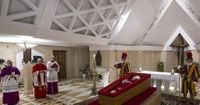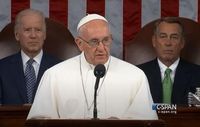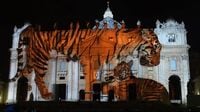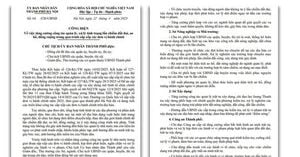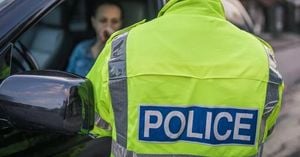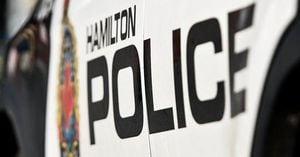Pope Francis, who passed away on April 21, 2025, at the age of 88, leaves behind a legacy marked by his unique approach to leadership and social issues. His death, attributed to a stroke combined with cardiological collapse, was confirmed by the Vatican, which noted that the Pope had been suffering from various health issues, including type 2 diabetes and high blood pressure.
Francis, born Jorge Mario Bergoglio in Buenos Aires, Argentina, made history as the first pope from the Americas and the Southern Hemisphere. His papacy, which began in 2013, was characterized by a focus on the marginalized, environmental issues, and a more inclusive approach to the Catholic Church. He visited the United States only once, in September 2015, but that trip left an indelible mark on American society.
During his U.S. visit, which began on September 22, 2015, with his arrival in Washington, D.C., he met with President Barack Obama at the White House. This visit came at a time when American Catholics were grappling with significant issues such as religious freedom, same-sex marriage, and contraception. In his meeting with Obama, Francis praised efforts toward inclusivity but emphasized that religious freedom is one of America’s "most precious treasures."
The next day, September 23, he celebrated Mass at the National Shrine of the Immaculate Conception, where he canonized St. Junípero Serra, marking the first canonization to take place on U.S. soil. He described Serra as a symbol of a "Church that goes forth to bring the reconciling tenderness of God to all." Later that day, he quietly visited the Little Sisters of the Poor, a religious community engaged in a legal battle over conscience rights against government regulations.
On September 24, 2015, Pope Francis made history as the first pope to address a joint session of Congress. His speech was a powerful call for life, social justice, and peace. He condemned the arms trade and the death penalty while highlighting the importance of family, which he described as "wounded like never before." He drew inspiration from historical figures like Abraham Lincoln and Martin Luther King Jr., referring to them as defenders of freedom and moral values.
After his address, Francis traveled to New York City, where he spoke at the United Nations on September 25. He urged global leaders to reject "ideological colonization" and insisted that any international intervention must respect national identities. Later that day, he visited Ground Zero, meeting with the families of victims and survivors of the September 11 attacks. In a solemn atmosphere, he prayed for peace, reminding those present that "behind every act of violence lie specific faces, stories, and names."
His day continued with a visit to a Catholic school in Harlem and culminated in a Mass at Madison Square Garden, where he called for remembrance of those invisible to society: the homeless, migrants, and forgotten elderly. His message was one of hope, urging engagement and action.
The final leg of his trip took him to Philadelphia for the World Meeting of Families. During his time there, he emphasized the roles of clergy and women in the Church and the importance of accompanying families. On September 27, he met privately with victims of sexual abuse, expressing that their stories "angered his heart" and promising vigilance and accountability from the Church. That same day, he visited a prison, telling inmates that every person carries the wounds of life, but God does not reject anyone.
At the end of his journey, he celebrated Mass for participants of the Family Meeting, thanking Americans and expressing hope that their shared days would yield lasting fruits. He stated, "As we have received much, let us give in return." This visit, though brief, profoundly impacted the Catholic community and American society at large.
Francis's commitment to environmental issues was encapsulated in his encyclical Laudato Si', published in 2015, which focused on the necessity of protecting nature. This document marked a significant shift in the Church's approach to ecological concerns, urging a departure from the belief that humanity should dominate the Earth. The encyclical emphasized care for creation and the need for a collective response to climate change, themes that resonate strongly in today’s world.
Following his death, tributes poured in from around the globe, reflecting on his commitment to social justice, peace, and environmental stewardship. Cardinal Pietro Parolin, the Vatican Secretary of State, expressed condolences and noted, "His Holiness was informed of the death of Bishop Piotr Wojciech Turzyński and sends his fatherly closeness to the family and the faithful of the Diocese of Radom."
As the world mourns the loss of Pope Francis, preparations are underway for his funeral. On Wednesday, April 23, 2025, at 9 a.m., his body will be moved from the chapel of the Dom Świętej Marty to St. Peter's Basilica. The ceremony will include a prayer led by Cardinal Kevin Farrell, and from 11 a.m., the faithful will be able to pay their respects at his coffin.
The funeral will take place on Saturday, April 26, 2025, at 10 a.m., presided over by Cardinal Giovanni Battista Re. It is expected that around 200,000 people will attend, including 170 official delegations from various countries, among them U.S. President Donald Trump and Polish President Andrzej Duda.
Pope Francis leaves behind a legacy of compassion, inclusivity, and a profound commitment to the marginalized. His teachings and actions have inspired millions, and his call for a more just and equitable world will continue to resonate long after his passing. As he once said, "Love knows no bounds and fears no streets." The world will remember him not only as a spiritual leader but as a voice for the voiceless, a champion of the environment, and a beacon of hope in challenging times.
![Gorący dzień w Sejmie. Andrzej Duda wysłucha expose Radosława Sikorskiego [RELACJA NA ŻYWO]](https://thumbor.evrimagaci.org/fuj3Ma9Ll3mc4l9QcTGyz7pqI34=/200x0/tpg%2Fsources%2F99a8eae7-c517-4a29-8cd2-ea7ec6e0e068.jpeg)
